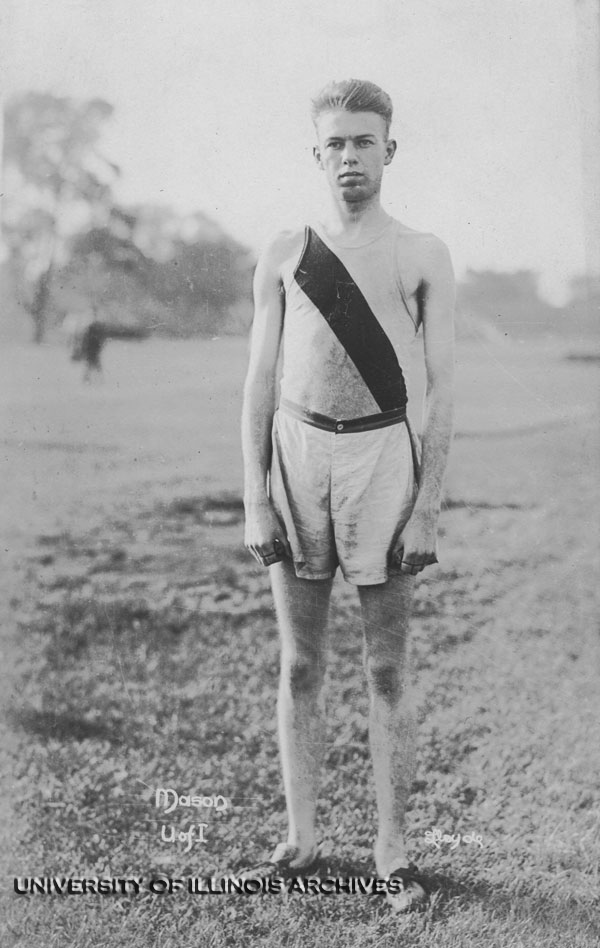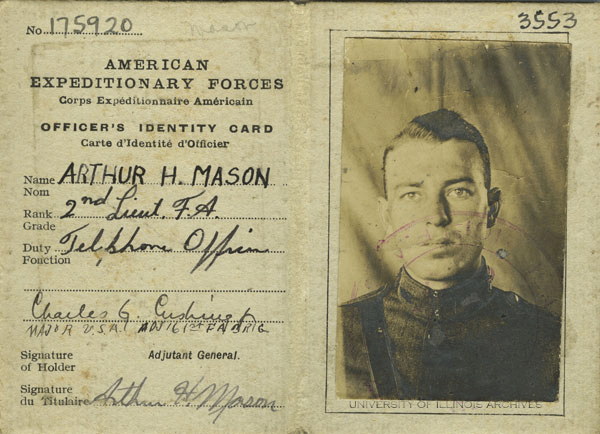
In a 1937 News-Gazette article on the “past glory of Illinois track teams,” legendary Illini track coach Harry Gill named Arthur H. “Mike” Mason one of the best runners and fiercest competitors he ever witnessed. Gill recounted how Mason lost his shoe during a two mile race in 1915. Despite attempts to flag him down to prevent injury, Mason kept running and finished in the lead, setting a new Big Ten and Illinois record with a time of 9:42 2-3. After helping him to the locker room, Gill recalled how “a bloody sock was removed and the whole callous of his foot dropped off with it. That run was the greatest exhibition of courage I have ever witnessed.” [1] Mason bested this time on several occasions, and his records of 4:18 and 9:33 for one and two mile races stood until the 1920s. [2]
Mason spent his early life in Minnesota and moved to Urbana when his father Arthur S. Mason acquired a stake in the Leavitt Manufacturing Company, which fabricated bleacher units and animal dehorning clippers. Mason graduated from Urbana High School in 1912 and received a B.A. in Accountancy from the University of Illinois in 1916, where he also joined Delta Upsilon fraternity and Ma-Wan-Da. Given his success on the track at Illinois, he would have been a candidate to represent the United States in the 1916 Olympics had the war in Europe not prompted their cancellation.
But like many young men of his generation, this was not the only way the war altered the course of Mason’s post-U of I life. After a brief stint with Montgomery Ward in Chicago, Mason applied and was accepted to the officer’s reserve corps. He wrote to his parents on his decision to volunteer: “You may be touched with sorrow that your son has placed himself, or will place himself if he becomes a member of the officer’s reserves, subject to call by his country. But you must remember that if this war should develop to such an extent that the reserve officers were called out, your pride would be hurt if your son did not volunteer.” [3]

The reserves were called out, as it happened, and in August 1917 Mason was sworn in as a 2nd Lieutenant in the Field Artillery Section. [4] His experience as an athlete at Illinois influenced his mindset as he prepared for deployment to combat. Just before embarking to France with the 332nd Field Artillery of the American Expeditionary Force in September 1918, Mason wrote to his parents: “My life in the army has not been unlike that which I experienced in my athletic days. The past year has been training for the big field day. But it will be a greater field day than in which I have here-to-fore competed. I am the champion of my own dear parents[,] the world liberty and God himself. I will bear myself like a champion and bring honor to those who love me most. It is a privilege to go, may the Lord make me worthy and a true fighter.” [5] Mason was on his way to the front in France when the armistice was signed in November, ending the conflict. He was both relieved that the war came to an end, but somewhat ambivalent that after training so long and coming within a few days of the front, he did not see any combat. In another letter home dated November 21, 1918, he wrote, “I am of course thankful that this bloody struggle is over, and I that I will soon return to my dear father & mother to good old U.S.A. the best country in the world, to a civilian life and a job. Yet I regret that I have been denied the privilege in taking an actual part in the conflict. Again, I am anxious to get home, but would rather not be among the first troops to arrive. Undoubtedly the first troops will receive a great reception, and I can not but feel that we are not entitled to it.” [6] Despite these initial misgivings, later in life Mason was known to joke that the war ended so abruptly “because he was there.” [7]

These letters are included in the recently-acquired Arthur H. Mason Family Papers located in the Student Life and Culture Archives. In addition to the extensive correspondence from Mason himself, the collection includes letters from Mason’s cousin Ralph Norgaard and Charles A. McLellan (no relation to Mason), both of whom served in the infantry during World War I. A highlight of the collection, this correspondence as a whole provides a rich portrait of the experiences, daily lives, and psychological state of young men as they prepared for and fought in the war. The collection also documents Mason’s family history and genealogy, his family’s life in Urbana and connections to relatives in Wisconsin, Minnesota and Vermont, his career at U of I, his military service, and his professional and family life in Minnesota and Highland Park, Illinois. The collection includes extensive correspondence, photographs, awards, memorabilia, scrapbooks and news clippings, and will be an excellent resource to University of Illinois students and researchers studying World War I, local history, and student life and athletics at Illinois in the early twentieth century.

[1] “Harry Gill Thinks Mason Greatest of All Illinois Track Stars,” News-Gazette, Nov 17, 1937.
[2] Mason Papers – University of Illinois – Track Runners Clippings, c.1925, RS 41/20/230, Student Life and Culture Archives.
[3] Mason Papers – World War I – Arthur H. Mason Correspondence 1917 (folder 1/2), RS 41/20/230, Student Life and Culture Archives.
[4] Mason Papers – World War I – Arthur H. Mason Correspondence 1917 (folder 1/2), RS 41/20/230, Student Life and Culture Archives.
[5] Mason Papers – World War I – Arthur H. Mason Correspondence 1918 (folder 2/5), RS 41/20/230, Student Life and Culture Archives.
[6] Mason Papers – World War I – Arthur H. Mason Correspondence 1918 (folder 3/5), RS 41/20/230, Student Life and Culture Archives.
[7] Mason Papers – Family and Professional Life – Arthur H. Mason obituary and eulogy, 1983, RS 41/20/230, Student Life and Culture Archives.